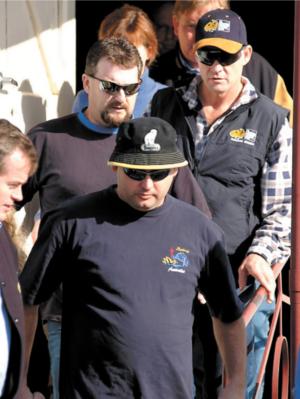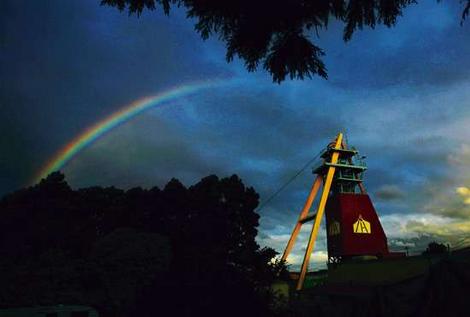Yesterday I rang up Sydney ABC talk-radio (that's our national public radio for the foreign readers), as I do once or twice a month when I'm on my way to pick up the kids from school (using the hands-free, and I pull over when I'm talking, honest!). But for the first time, I gave my name as tigtog rather than Viv or Vivienne.
You know what? I felt different when I was talking. Somehow tigtog appeared to make her points more pithily and assertively than Viv does. Viv goes "um" on air distressingly often, tigtog banters fluently. Weird. I managed to make a recommendation, stick to my guns assertively but good-humouredly when challenged, and also get in a quick reference to a topical tangent I could "rant" about if only he had the time (that made the radio host laugh).
See,
James Valentine was doing his Form Guide modern etiquette spot, and yesterday was posing a question from a waitress as to the how-to of addressing trans-folk (simplistically, those who dress as the opposite gender to their sex) - should she say sir/madam according to the genderised clothes being worn or the birth-sex she can discern? My first thought was that if the restaurant has a lot of trans-folk patrons and wish to keep their lucrative custom, then why on earth hasn't the management discussed this matter with their staff?
What prompted my call was that the waitress' question, and Valentine (whom, I must emphasise, is one of the good guys generally as far as liberal social tolerance virtues go), kept on referring to the cross-dressing restaurant patrons as "wearing drag". The restaurant in question is apparently close to Oxford Street, so perhaps those
transgendered customers are in fact all drag queens, but as the question also referenced a medical secretary wondering whether to call transgendered patients by the sex she knew from the records or by their gender presentation in the waiting room, I bet that in fact at least some of those transgendered customers are routine cross-dressers.
This confusion between drag and broader cross-dressing wasn't helped by Valentine having as his "expert" guest an Oxford Street drag queen, who gender-presented for this programme as male, and who easily made the (surely?) obvious point that proper etiquette is to address people "wearing drag" as their gender presentation (although he professed to find burly blokes addressing a fully-stage-costumed drag queen as "mate/dude" merely amusing).
It was interesting that he also confessed to finding it difficult to refer to his drag king friends as he/him, even though in the dressing room all the drag queens call each other she/her. This drag queen was perfectly happy to describe all cross-dressers as "wearing drag", presumably because that's his habit, and he's perhaps never thought particularly about the implications of referring to all cross-dressing as "wearing drag", and also those words also have a different weight used
between trans-folk than when used
about trans-folk.
Now, I've worked on stage with drag queens and drag kings, and I've

also worked with transgendered people in hospitals as both colleagues and patients. There's a huge difference between people making a performance which is all about laughing at exaggerated gender-stereotype reversal and people who are making a journey from
cisgendered to transgendered (for brevity's sake I won't go into the challenges to the binary masculine/feminine gender construct presented by folks who are
intergendered or
intersexed). "Drag" is performance-art gender presentation, routine cross-dressing is gender-identity gender presentation. Referring to all trans-folk as being "in drag" not only trivialises the gender identity of transgender and intergender folks by equivalencing it with the unreality of performance art, but also reinforces stereotypes of histrionic queens and hostile bull-dykes and buys back into the whole binary gender construct all over again.
So, I got past the producer and got on air. I gave my opinion to Valentine that referring to all cross-dressing as "wearing drag" is insensitive, insisted that he should address this in a discussion on transfolk etiquette (he mildly objected that he didn't want to "get into all that" and just wanted to discuss correct modes of address with respect to gender presentation) and I then made a crack about how he was only touching the surface of what could be discussed regarding the limitations of binary gender constructs but I bet that he didn't want to get into all that either. He laughed at the last, saying that maybe discussing binary constructs of gender could wait for another day, and to his credit stopped referring to routine cross-dressing as "wearing drag" from then on. Result.
Unfortunately I didn't have time to give him some better queer studies jargon to use, so he struggled a bit after that with labels, but that's probably actually a good thing in terms of challenging preconceptions and stereotypes. I'm far from a queer studies expert anyway, just someone who's done some reading because of my interest in binary cisgender constructs from a feminist perspective, and the language being used (admittedly on a fairly fluffy light entertainment talkback show) just seemed so archaic, quaint and downright politically incorrect. I had to leave the car for a while to run an errand, and when I came back he seemed to be better informed jargon-wise and coping with labels a bit more easily, so that was good.
But I was still surprised that in Sydney, on the national broadcaster, the default was to talk about "people wearing drag" rather than "transgendered" and "gender presentation". The trans/inter-gender people in our community obviously are coping with a much higher level of general ignorance than I would have thought.
Some resources for those who want to know more:
Piny at Feministe writes a lot about his experiences transitioning and about challenging
heteronormativity and binary gender roles generally, although I'm having some trouble navigating the archive to find articles I remember him writing.
An excellent glossary of intersex/transgender jargon at
ITPeople.Another glossary at
Transexual Roadmap.
















